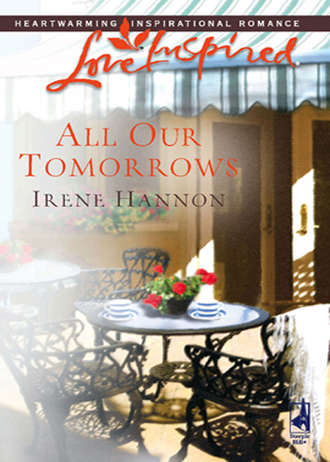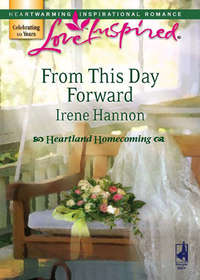
Полная версия
All Our Tomorrows
“I’m sorry,” she repeated.
He lifted one shoulder. “I survived. My faith was a great comfort.”
Another contrast between the two brothers, Caroline thought, recalling Michael’s skeptical attitude toward religion in general. Though the brothers hadn’t been raised in a household where faith played a central role, David had sought out the Lord as an adult. And the Christmas they’d met, Caroline had discovered that he’d found something that she had envied deep in her heart. An inner peace. A sense of greater purpose. Something to cling to through the turbulent seas of life. She’d wanted to question him about it, but the time hadn’t been right then. Nor was it now. In ten minutes she was scheduled to do a phone interview with the mayor, and she needed to get focused.
“Well…I do have to get back to my desk. Was there something you wanted to talk about?” she asked when the silence between them lengthened.
With a jolt, David realized that she wasn’t going to invite him to her office. Although Mary appeared to be busy, he suspected that she was tuned in to the conversation taking place only a few feet away, and what he had to say wasn’t meant for public discussion. But he wasn’t leaving without accomplishing the purpose of his visit.
“Is there somewhere private we could speak?” He lowered his voice and angled his body away from the receptionist.
After a brief hesitation, Caroline nodded. “But I have a phone interview to do in a few minutes.”
“I’ll be brief.”
Without responding, she turned and led the way to the inner door, holding up an ID card to the scanner. The door responded with a click and she pulled it open.
The office was much more expansive than David expected. And far more modern than the quaint exterior of the building had suggested. The newsroom was quite large and honeycombed with dozens of cubicles. There was a hum of activity, and staff members stopped Caroline twice to ask her questions as she led the way through the maze.
When they reached her glass-enclosed office, she stepped aside and motioned him in, then followed and closed the door behind her.
“Busy place,” he commented.
“And this is a quiet day. You should see it when things are really hopping.” She moved to her chair, putting the desk between them.
“I guess I didn’t realize that a smaller paper would be so…thriving.”
“The Chronicle isn’t small. It’s the second-largest paper in the city, next to the Post-Dispatch, and we continue to acquire smaller community newspapers. But I don’t need to tell you how mergers and acquisitions work. You deal with that every day.”
“Not anymore.” At her surprised look, he explained. “I took a new job a couple of months ago. As executive director of Uplink, an organization that pairs gifted high school students in problem environments with mentors for summer internships. That’s why I moved to St. Louis. But it seems you’ve changed directions, too. I thought you’d be back at the Associated Press by now.”
Her eyes went flat. “No. I’ve seen enough blood, sweat and tears to last a lifetime. This suits me just fine.” She checked her watch, and he got the message.
“I know you’re on a tight schedule, so I won’t keep you.” He reached into the pocket of his jacket and withdrew a small, tissue-wrapped object. “When I was packing for the move, I came across this among Michael’s things. A few weeks after he…after the bombing…AP sent me some personal effects that had been returned by the authorities. I didn’t give them more than a cursory look at the time. It was too hard.” He stopped and cleared his throat. “I did notice this, but to be honest, I thought it had been sent to me by mistake, that it belonged to one of the other victims. It wasn’t a symbol I would have associated with Michael. But when I was packing, I looked at it more closely and saw the initials. I think it must have been something you gave him. So I thought you should have it.” He handed it across her desk, his lean, strong fingers brushing hers as she reached for it.
Curious, Caroline unwrapped the tissue. Nestled inside lay a small pewter anchor on a chain. As she stared at the medallion, the air rushed out of her lungs in a sudden whoosh. She groped for the edge of her desk, and for a brief second the room tilted. Then firm, steadying hands gripped her upper arms, and the world stabilized.
“Are you okay? Why don’t you sit down for a minute?”
She drew in a ragged breath before she lifted her head. David’s concerned face was just inches from hers as he leaned across her desk.
“I’m fine. It was just a…a shock.” Nevertheless, she made a move to sit in her chair, not trusting her shaky legs to hold her up.
As David released her arms, he shoved one hand in the pocket of his slacks. “I was pretty sure the initials on the back were yours.”
Turning the anchor over, she traced the familiar inscription with a gentle finger. CMJ to MWS.
“I gave this to Michael the Christmas we got engaged.” Her voice was whisper-soft. “He always told me that I was his anchor. That whenever the world got too crazy, he would think about me, and then everything made sense again. That I kept him stable through the storms of life. After I gave this to him, he never took it off. He said it was his good luck charm.”
Her voice choked on the last word, and David swallowed hard. No doubt they were sharing the same thought: that he hadn’t been so lucky the day he’d gone to the marketplace.
“There’s something I’ve been wanting to say to you for two years, Caroline. I’m sure you know that Michael and I argued about Mom the night before he was…before he died. And that our relationship had been strained for several weeks. You have every right to put at least some of the blame for his death on me. I know he was upset when we talked. And I’m sure he was distracted when he went out on that assignment the next day. I lived with the guilt for almost two years, and even though I found some measure of peace about it after a great deal of prayer, I suspect it will always be with me to some degree. I just want you to know how sorry I am. And that I hope you can find it in your heart someday to forgive me.”
The regret and anguish on David’s face mirrored that in her heart. Yet she knew hers was far more deserved. That she was even more culpable than the man across from her. No one else was aware of that, though. She’d never spoken to anyone of the part she had played in Michael’s death. But now that she realized the depth of David’s distress, had glimpsed the burden of pain that weighed down his heart as he shouldered all the blame, she couldn’t in good conscience keep her role a secret from him. It wouldn’t be honest. Or moral. She might not agree with the steps he’d taken, against Michael’s wishes, to institutionalize their mother, but she couldn’t let him continue to think that he alone was at fault for the tragedy.
Gripping the medallion in a tight fist, Caroline rose. When she spoke, her voice was taut with tension. “The guilt isn’t all yours, David. Or even mostly yours.”
“What do you mean?” He sent her a puzzled look.
She tried to swallow past the lump in her throat. “Michael shouldn’t have been in the marketplace that day. It was supposed to be me. I was working on a hot story, but I got sick. He volunteered to meet my contact for me.” Her face contorted with anguish, and when she continued her voice was a mere whisper. “I was the one who should have been killed by the suicide bomber.”
A shock wave passed through David as he digested Caroline’s revelation—and tried to comprehend its ramifications. Somewhere, in a far corner of his mind, he realized that her confession had absolved him from a portion of the blame for the tragedy, and he felt a subtle easing of the guilt that had burdened his heart for two years. But in the forefront of his consciousness was the realization that for those same two years the woman across from him had borne a burden even greater than his on her slender shoulders. The man she loved had done her a favor, had taken her place and he’d been killed. He’d thought his guilt had been wrenching. How much more intense it must have been for Caroline, who lived now because Michael had died.
The devastated look on her face bore that out and twisted his gut into a painful knot.
“I’m sorry, Caroline.” The words were wholly inadequate, but he didn’t know what else to say.
“I’m the one who’s sorry,” she whispered. “You have every right to hate me.”
“How can I hate you for getting sick?”
“Because I shouldn’t have let that stop me. I still should have gone. It was my responsibility, not Michael’s.”
“How sick were you?”
She shrugged. “Pretty sick. I had some weird virus.”
“Did you have a fever?”
“Yes. A hundred and three.”
“You needed to stay in bed.”
“That’s what Michael said.”
“He was right.”
“No.” Her voice was resolute. “I should have gone.”
“You’d have been killed.”
“I know. But it should have been me.” Her voice broke on the last word.
“Do you think that’s what Michael would have wanted?”
David’s quiet question startled her. And the answer was obvious. No, of course not. Given a choice between who would live and who would die, Michael would have taken her place in a heartbeat. But that was beside the point. She wouldn’t have let him.
She shook her head. “Thanks for trying. And thank you for this.” She cradled the medallion in her hand, fighting back tears. She hadn’t cried at work in a long time. And she didn’t intend to start now.
“Maybe God had other plans for you, Caroline. Maybe that’s why He took Michael instead of you.”
Jolted, she stared at him. That was a new thought. And a generous one, considering that she was the primary reason David had lost the brother he loved. But it wasn’t one she put much stock in. She saw no greater purpose in her life than had been in Michael’s, didn’t think she had any more to contribute than he had. His work had been Pulitzer-prize quality. She was good at her job, but not as good as he had been. No, that explanation didn’t hold up for her.
She was saved from having to respond by the jarring ring of the phone, reminding her that she had an interview to conduct. Even if talking with the mayor right now about the new zoning law was about as appealing as…playing her mother’s guessing game.
“That must be your interview. I’ll let myself out.”
“Thank you for coming today,” she said as she reached for the phone.
“It was long overdue.”
As she put the phone to her ear, mouthed a greeting and waited to be connected to the mayor, she watched David make a quick exit, then weave through the newsroom toward the front door. When he reached it, he turned back. Their gazes connected, and held, for a brief second. But it was long enough for Caroline to sense that for David, their meeting today had provided a sense of closure. Then he lifted his hand and disappeared through the door. It shut behind him, with a symbolic sense of finality, giving her the distinct feeling that he had no intention of contacting her again. That his visit today had tied up the last loose end associated with Michael’s death.
Caroline wished she could find that same sense of closure. That she, too, could shut the door on her past. But for her, the pain, the regret, the guilt, just wouldn’t go away.
David, on the other hand, seemed to have found some sense of comfort, some relief, some absolution, in his faith. Not to mention a wellspring of charity. Instead of hating her when she’d revealed her part in Michael’s death—as he’d had every right to do—he’d put it in the hands of the Lord, suggesting that perhaps God had other plans for her.
And for just a moment, as she had on that Christmas when they’d met, she envied him his bond with a greater power, which had given him answers and lightened his burdens while hers still weighed down her soul.
Chapter Two
“That’s good news on the funding front, Martin. Every donation helps. Thanks for the report.” Chairman Mark Holton checked the agenda for the Uplink board meeting. “Looks like you’re next, Allison. What’s the latest on signing up mentoring organizations?”
“Good news there, too. Several more businesses have agreed to take on student interns over the summer. But a lot of the companies I contacted had never heard of Uplink. I think we need to find a way to generate some additional publicity.”
“Point well taken.” Mark surveyed the eight-member board, ending with David. “Any thoughts?”
“Well, after only a couple of months on the job, I have limited experience to draw on,” David responded. “But I’ve run into the same issue with my outreach efforts at schools. Some of the administrators are familiar with the program, but most of the students aren’t. It wouldn’t hurt to have some coverage in the local media.”
“I agree.” Mark turned to Rachel Harris, the publicity chairperson. “Have we pitched any stories in the past few weeks?”
“No. Not since the Post-Dispatch did that piece last fall. It might not be a bad idea to contact the Chronicle, considering its wide reach. I can make a cold call, but if anyone has a connection there it would be helpful.”
“I know the managing editor,” David offered.
“Excellent.” Mark jotted a few notes on a pad in front of him.
Now what had prompted him to blurt that out? David chided himself in dismay. He’d had no intention of contacting Caroline again after he walked out of her office a few days before.
“Could you make a call?” Mark asked. “Rachel can follow up, but it might help if you paved the way.”
David wasn’t so sure about that. But short of explaining his link to Caroline—which he didn’t intend to do—he was left with no option but to agree. “Sure. I’ll call her later this week.”
“All right. Now why don’t you bring us up-to-date on your outreach efforts at the schools.”
As David gave them a quick overview of his busy schedule of visits to area high schools, he focused on a few institutions in the most troubled parts of the city, where he’d put a great deal of effort into recruiting participants. When he ticked off their names, a few board members shifted in their seats and exchanged uneasy glances.
“Is there a problem?” David asked.
“I think there’s some concern about soliciting participants from those schools,” Mark told him when no one else spoke. “Many of them have gang problems, and those students may not be the best representatives for our program right now. If any of them cause trouble at their assigned businesses, it could hinder our efforts.”
“And if they succeed, it could help our cause.”
“It’s the if we’re worried about.”
“Let me make sure I understand the issue.” David folded his hands on the table in front of him and leveled a direct gaze at the chairman. “I thought the mission of Uplink was to reach out to gifted students who were in environments that might sabotage their continued education. I was working on the assumption that our goal was to offer them an opportunity to develop their talents and encourage them to continue in school by giving them role models and experience in a real-world setting. To provide them with a taste of the kind of life they might have if they persevere despite the obstacles that their present situations might present. Is that correct?”
“Yes,” Mark affirmed.
“Then we need to be aggressive in our recruiting or we’ll fail.”
“We’ll also fail if we recruit students who cause problems with the participating businesses.”
Stifling a frustrated sigh, David nodded. “Understood. But unless we offer this program to those who need it most, we’re doing a disservice to our mission.”
“David has a point.” All heads swiveled toward Reverend Steve Dempsky, one of the charter board members. “If we play this too safe, the program loses its meaning. Let’s not forget that we were heading in that direction under our former director. We brought David in to give the program some punch, to make it more dynamic and cutting edge. I don’t think we want to tie his hands at this point. We need to trust his judgment and have confidence he won’t take undue risks that put Uplink in danger.”
As the board digested the minister’s comments, David sent him a grateful look. Steve had been his college roommate, and they’d never lost contact. In fact, Steve had been the one who’d told him about this job and recommended him to the board. He appreciated not only his friend’s confidence, but also his willingness to put himself on the line over an issue that was stickier than David had expected.
“Your points are well-taken, Reverend.” Mark turned to the other members of the board. “Do we need any further discussion on this?” When those seated around the table shook their heads, Mark nodded “All right. I’ll see you all next month, same time, same place.”
The rustle of paper, muted conversation and the scrape of chairs signaled the end of the meeting. David stood, gathered up his notes and made his way toward Steve.
“Thanks for the vote of confidence,” he told him.
The sandy-haired minister flashed him a smile and spoke in a low voice. “Just don’t blow it. Or we’ll both be out on our ear.”
A wry smile tugged at the corners of David’s lips. “That makes me feel real secure.”
The other man laughed and put his hand on David’s arm. “Just kidding. I trust your instincts. But if you need a second opinion about any of your candidates, I’ll be glad to talk to them, too.”
“I may take you up on that.”
“Will I see you at services Sunday?”
“Have I missed a week yet?”
“No. You’re very faithful. I just wish I could have convinced you years ago to give religion a try.”
“The timing wasn’t right, I guess.”
“Well, I’m glad you finally saw the light. Listen, call me some night next week and we’ll go out for pizza. Monica will be in Chicago for a conference, and I’ll be scavenging for food.”
“You could learn to cook.”
“My friend, I have been blessed with a number of talents. But cooking is not among them. My culinary forays have been a disaster. In fact, Monica has banned me from the stove and the oven when she’s home. Trust me, she’ll be glad if I eat out instead of messing up her kitchen. So call me, okay?”
A chuckle rumbled deep in David’s chest. “You’ve got a deal.”
“And don’t worry about today’s meeting. The board has always tended to err on the side of caution, but the members are working on that. Intellectually, they realize that nothing worth doing is accomplished without some risk, but it will take a little time for that understanding to reach their hearts. In the meantime, follow your instincts.”
Another board member claimed Steve’s attention, and David turned with a wave and headed toward the door. Despite Steve’s parting words, he wondered if he was pushing too hard. Yet he prayed for guidance every day, and he was convinced God had led him to this place for a reason. He was also sure the Lord wouldn’t want him to take the easy way out.
But the board’s reaction was unsettling. If he made a wrong step, he could be ousted—just as his predecessor had been. And for a man who until recently had put a high priority on financial security, that was a scary thought. Growing up in a blue-collar family, where times had always been lean—and gotten even leaner when their father died too young and their mother had to take a job as a cook in a diner just to make ends meet—David had vowed to find a career that provided an income high enough to eliminate financial worries. He’d achieved that—in spades—in his former job. But over time he’d felt a call to do something else, something that made a difference in lives instead of balance sheets. Steve’s call six months ago, alerting him to an upcoming opening at Uplink, had seemed almost providential. David had prayed about it—had even prayed that God not ask him to apply for it—but in the end, the call had been too strong to ignore. So he’d put his trust in God and taken a leap of faith. He just hoped he hadn’t leapt into unemployment.
But as Steve had just reminded him, nothing worth doing was accomplished without some risk. And even if he failed, he would be able to take some comfort in knowing that he’d followed God’s call and done his best.
David reached for the receiver, hesitated, then let his hand drop back to his desk. He wished he hadn’t volunteered to contact Caroline about a story for the Chronicle. Seeing her once had been hard enough. Now he had to call and ask for her assistance. At least it was for a larger cause and not a personal favor. Still, it made him feel uneasy. And unsettled. In fact, he’d been feeling that way ever since his encounter with her the week before.
And he knew exactly why.
For one thing, their meeting had dredged up memories of the tragedy that had robbed his brother of his life. Had made him recall the day he’d been pulled out of a major negotiation session to take an urgent call that his usually efficient secretary hadn’t seemed able to handle. He remembered muttering, “This better be important,” as he swept past her with an irritated glance. He’d still been annoyed when he’d picked up the phone. Until he’d heard Caroline’s almost hysterical voice on the other end of the crackling line, telling him between ragged sobs that Michael was dead.
David’s gut had twisted into a hard knot, and he’d sagged against the desk, almost as if someone had delivered a physical blow to his midsection. He’d been too shocked to comprehend much else of what she’d said. And when she’d hung up, he’d sat there in stunned silence, until at last his secretary had knocked on the door to remind him that the high-powered group assembled in the next room was waiting for him.
It had been a nightmare day. And the two weeks that followed had been just as horrendous. He’d decided not to tell his mother, who was slipping away day by day, fearing that the news—if she even understood it—would strain her heart, which was already weak. So he’d stood alone at the funeral. Caroline had been beside him physically, but she’d been as unreachable as the distant peaks he’d spotted on his trek in the Himalayas last year. And looking at her devastated face, watching the way her hands shook, had only exacerbated his own pain—and guilt.
Seeing her again had brought all those memories back. So he shouldn’t be surprised that the incident had unsettled him. Nor should he be surprised that the thought of contacting her again made him uneasy.
But he knew it was more than that. Knew that his feelings reflected something far deeper and less obvious, something he’d fiercely suppressed since the day Michael had escorted Caroline through the door of his mother’s apartment and introduced her as his fiancée.
The fact was, from the first moment he’d laid eyes on her, David had been smitten. There was no other word for it. Nor any basis for it. He was an adult, after all. He’d been thirty-four when they met, not some teenager whose hormones could be whipped into a frenzy by the mere sight of a pretty face. In fact, he’d been so stunned by his unexpected reaction to her that he couldn’t even recall much about that first meeting. He supposed he’d managed to sound coherent, because no one had acted as if he was behaving oddly. But he’d been so thrown that for the rest of Caroline and Michael’s three-day visit, he had made it a point to avoid one-on-one conversations with her. He was afraid his tongue would get tangled up or, worse, that it would sabotage him and say something inappropriate. Such as, “I know you’re engaged to my brother, but would you marry me, instead?”
That, of course, wasn’t even a consideration. David had never intruded on Michael’s turf. Not as a child, not as a teenager, not as an adult. He loved his brother too much to do anything to jeopardize their relationship. In fact, if the truth was known, he’d always had a case of hero worship for him. He’d admired his sense of adventure, his willingness to take risks, his easygoing manner, his go-with-the-flow attitude. Not to mention his choice of women. Particularly his fiancée.









